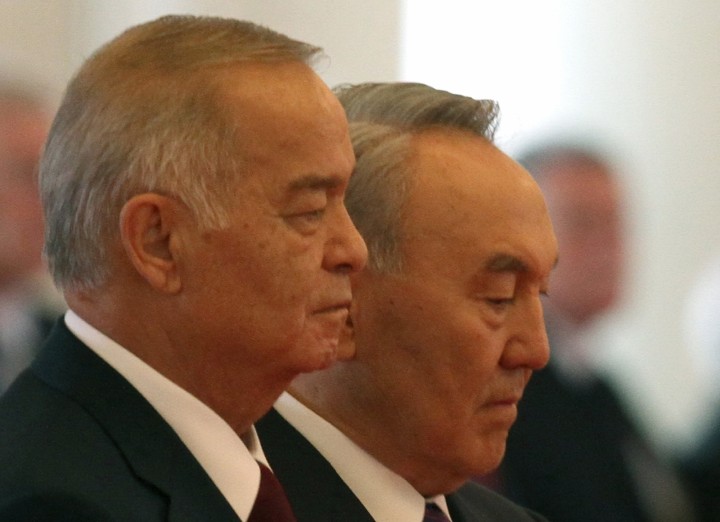 Kazakhstan and Uzbekistan are both expected to re-elect their leaders this spring. Few will be surprised if Nursultan Nazarbayev keeps his job in Kazakhstan - though he's yet to announce he is running again - or if Islam Karimov stays president in Uzbekistan.
Kazakhstan and Uzbekistan are both expected to re-elect their leaders this spring. Few will be surprised if Nursultan Nazarbayev keeps his job in Kazakhstan - though he's yet to announce he is running again - or if Islam Karimov stays president in Uzbekistan.
Both have been in charge since Soviet times and are two of the longest serving leaders in the world. Here are five tried and tested tactics they have used to keep themselves in power.
1. Hold a referendum
People walk in front of a giant poster of Uzbek President Islam Karimov in Tashkent, 24 December 2007.
Often, instead of an election, a referendum is organised to extend the president's term. This was particularly popular in the 1990s when post-Soviet Central Asia was going through a painful transition and growing poverty, high unemployment and a declining economy meant holding an open election could have allowed an opposition to capitalise on public grievances.
Uzbekistan and Kazakhstan held referenda in 1995, which extended both presidents' terms until 2000. Another referendum in 2002 allowed Islam Karimov to rule Uzbekistan for an extra two years until 2007.
Since the idea of a referendum draws considerable criticism from the international community, the incumbent now tries to avoid it.
2. Elastic elections
If elections do take place in Central Asia, they are not necessarily on schedule.
This is the second time Uzbekistan has held a presidential election long after its leader's term has expired. This time, it was delayed to avoid a clash with parliamentary elections in December 2014 and will now take place on 29 March.
Calling elections early, as has been done three times in Kazakhstan, allows the leader to catch his opponents off guard - the main opposition boycotted the early elections in 2011, saying they had had little time to prepare.
Bringing the schedule forward can also be useful if difficult issues are looming and a leader wants to squeeze in a poll before they hit. Announcing early elections late last month, President Nazarbayev mentioned a "growing economic crisis" and "heightening geopolitical antagonisms" - hinting at the crisis in Ukraine - as some of the reasons for his decision. The vote will take place on 26 April.
A local election committee official carries a ballot box door-to-door for Uzbek Presidential elections in Tashkent, 23 December 2007.
In order to make early elections or referendums look legitimate, in Kazakhstan the initiative is often presented as having come from a group of citizens. The idea to hold early elections in 2015 was proposed by the Assembly of the Peoples of Kazakhstan. In 2011, millions of signatures were gathered in support of the bid to extend President Nazarbayev's term until 2020 through a referendum. And then as a "compromise" President Nazarbayev suggested early elections.
3. No real opposition
One of the main criticisms of the elections in Kazakhstan and Uzbekistan from observers at the Organisation for Security and Co-operation in Europe, a regional democracy watchdog, is the lack of competition. Plurality of candidates does not necessarily mean a genuine choice for voters, they claim. Opposing candidates tend to be pro-incumbent and in some cases they even admit that they voted for the incumbent.
This is arguably understandable given the pressures the candidates can face. The opposition leader who challenged President Karimov in Uzbekistan's 1991 elections, Muhammad Solih from the Erk party, had to flee the country as a result of the persecution he was facing.
In Kazakhstan, prominent opposition candidates usually fail to get as far as contesting the presidency. In 1999 main opposition candidate Akezhan Kazhageldin was convicted of participating in an unsanctioned rally, which automatically barred him from running for president. In 2011 the main opposition parties boycotted the vote, criticising the decision to hold early elections (see point 2).
4. Constitutional change
This spring, President Karimov is effectively running for his fourth term and if or when President Nazarbayev decides to run, it will be his fifth campaign. Even if the constitution stipulates a single person may serve only two terms, presidents of Central Asian states can easily bypass this by amending it, or adopting a new constitution. And previous terms served before the changes are not counted towards the new limit.
A local woman prepares to cast he vote in a mobile ballot box in the presidential election in the village of Kazakhstan, some 80 kms from Almaty on April 3, 2011.
However the leaders have provided some degree of stability
This is how Mr Nazarbayev and Mr Karimov were allowed to run for their third terms. But then Kazakhstan decided to ditch such meticulous legislative fiddling altogether and adopted a law that allows Mr Nazarbayev to serve an unlimited number of terms.
5. Electoral fraud
It is common for the incumbent to receive more than 90% of votes and the turnout is always very high. Experts claim that such high figures are achieved through fraud. OSCE observers report ballot staffing, multiple voting and other irregularities during elections. Their reports also regularly mention intimidation and pressure exerted on people to vote in favour of the leader.
Ironically, both Islam Karimov and Nursultan Nazarbayev would probably win elections without resorting to fraud, because in such a controlled political environment voters see no alternatives. But the fraudulently inflated numbers are viewed as crucial to boost the leaders' legitimacy. Low figures could show them as weak, which could send wrong signals to both allies and opponents.
BBC News, Almaty




